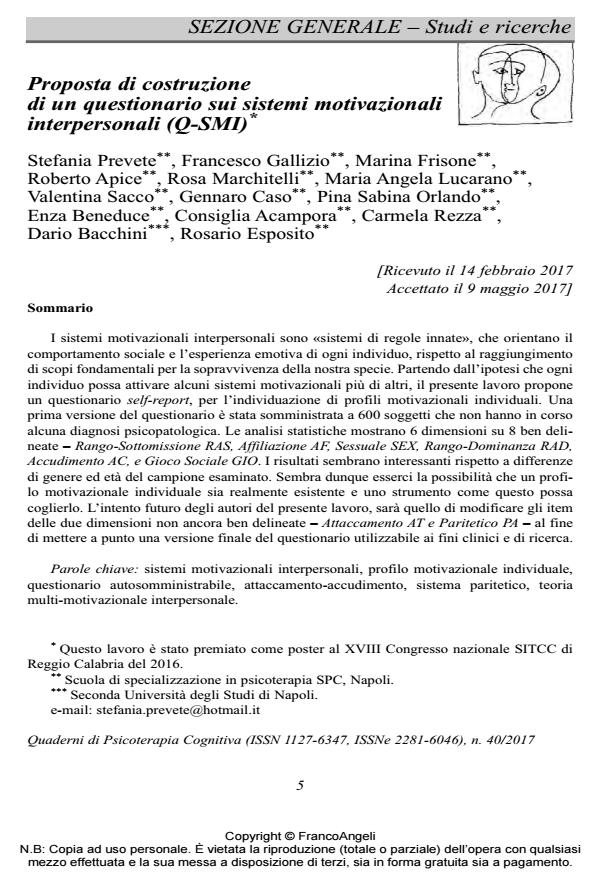Proposal for construction of a questionnaire on interpersonal motivational systems (Q-SMI)
Journal title QUADERNI DI PSICOTERAPIA COGNITIVA
Author/s Stefania Prevete, Francesco Gallizio, Marina Frisone, Roberto Apice, Rosa Marchitelli, Maria Angela Lucarano, Valentina Sacco, Gennaro Caso, Pina Sabina Orlando, Enza Beneduce, Consiglia Acampora, Carmela Rezza, Dario Bacchini, Rosario Esposito
Publishing Year 2017 Issue 2017/40
Language Italian Pages 16 P. 5-20 File size 164 KB
DOI 10.3280/QPC2017-040001
DOI is like a bar code for intellectual property: to have more infomation
click here
Below, you can see the article first page
If you want to buy this article in PDF format, you can do it, following the instructions to buy download credits

FrancoAngeli is member of Publishers International Linking Association, Inc (PILA), a not-for-profit association which run the CrossRef service enabling links to and from online scholarly content.
Interpersonal motivational systems are «innate rules systems» that guide social behavior and the emotional experience of each individual, with respect to achieve the fundamental goals of our species. Assuming that everyone can activate some motivational systems more than others, this paper suggests a self-report questionnaire for the identification of individual motivational profiles. A first version of the questionnaire was elaborated and submitted to 600 subjects not affected by a serious psychopathology diagnosis. Statistical analyzes revealed 6 factors of 8 well defined - Ranking-Submission RAS, Affiliation AF, Sexual SEX, Ranking-Dominance RAD, Caregiving AC, Social Game GIO. Interesting differences by gender and age concerning the relevance of motivational system emerged. The questionnaire is a promising tool in order to obtain an individual motivational profile. The next goal of the authors of this work will be to modify the item of the two dimensions not yet well defined - Attachment AT and Peer Cooperation PA - in order to develop a final version of the questionnaire usable in clinical and research applications.
Keywords: Interpersonal motivational systems, individual motivational profile, selfreport questionnaire, attachment-caregiving, peer cooperation system, multi-motivational interpersonal theory.
- Development and Validation of the Interpersonal Motivational Systems Questionnaire (IMS-Q) Rosario Esposito, Stefania Prevete, Concetta Esposito, Dario Bacchini, in Behavioral Sciences /2023 pp.784
DOI: 10.3390/bs13090784
Stefania Prevete, Francesco Gallizio, Marina Frisone, Roberto Apice, Rosa Marchitelli, Maria Angela Lucarano, Valentina Sacco, Gennaro Caso, Pina Sabina Orlando, Enza Beneduce, Consiglia Acampora, Carmela Rezza, Dario Bacchini, Rosario Esposito, Proposta di costruzione di un questionario sui sistemi motivazionali interpersonali (Q-SMI) in "QUADERNI DI PSICOTERAPIA COGNITIVA" 40/2017, pp 5-20, DOI: 10.3280/QPC2017-040001